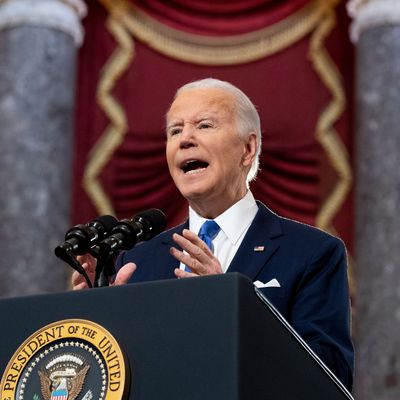
Living on the West Coast, I was still making coffee and feeding the dog when President Joe Biden began his speech commemorating the Capitol Riot from Statuary Hall on January 6. By the time I logged into Slack, my East Coast colleagues were urging me to tune in pronto. “Biden is on fire!” said one.
The source of this surprised excitement, which was likely echoed in places both friendly and hostile to Biden, was the president’s decision to abandon his yearlong habit of ignoring his predecessor. He failed to ignore him a remarkable 16 times in the speech. Though he never uttered the words “Donald Trump,” nobody was in doubt about the identity of “the former president” whom Biden blamed for inciting the mob that attacked the Capitol, for continuing his lies about the 2020 election, and for seeking (successfully, for the most part) to force the Republican Party to subscribe to his twisted and obsessive point of view.
And for all the speculation today about why Biden finally “went there,” the best explanation is the simplest. As senior Biden aide Mike Donilon told the Washington Post, “You can’t talk about what happened on January 6 without talking about the former president’s role in it.” Indeed, it would be like going to Disney World and avoiding the image of Mickey Mouse. For all the hair-splitting about Trump’s moral and legal responsibility for sending the mob on its fatal and seditious mission, no one can doubt that had Trump accepted his defeat when it became manifest on November 7, 2020, the way every other defeated presidential candidate had, there would have been no Capitol riot. The electoral-vote count in Congress that occurred on January 6, 2021, would have been an obscure and largely insignificant event, the way it had been in the previous 33 presidential elections, dating back to the enactment of the Electoral Count Act of 1887.
A Biden speech about the Capitol Riot that did not mention Trump would have reinforced the unfortunate but widespread impression that Biden is fecklessly drifting toward a midterm walloping and a one-term presidency, in part because of his inability to identify with the fears and anxieties of his supporters and the public at large. To his and his speechwriters’ credit, his attacks on Trump were well-wrought and biting, particularly this one:
Let’s speak plainly about what happened in 2020. Even before the first ballot was cast, the former president was preemptively sowing doubt about the election results. He built his lie over months. It wasn’t based on any facts. He was just looking for an excuse, a pretext to cover for the truth. He’s not just a former president. He’s a defeated former president. Defeated by a margin of over seven million of your votes. In a full and free and fair election.
There were a lot of important truths packed into that paragraph, wrapped in the kind of mockery of Trump as a loser that is sure to get under the “defeated former president’s” skin. And by stressing the extraordinary nature of Trump’s defiance of norms, Biden implicitly excused his own departure from the tradition of comity among presidents present and past (though to be clear, it has been more than a century since an ex-president — Theodore Roosevelt, in 1912 — posed so direct a threat to the reelection of his successor).
But precisely because this was an occasion that uniquely demanded calling out Trump — an occasion to which Biden rose — we should not assume that he will henceforth smite his past and likely future opponent on every occasion. It could have been a one-off, not to be repeated until such time as Biden and Trump are engaged in an electoral rematch, assuming that transpires.
Deciding whether, how, and when to go after Trump again will be tricky for Biden. The cheers heard around the country when he lashed out at Trump mostly emanated from Democratic-base voters and activists, who have been frustrated by Uncle Joe’s cautious tactics and uneven results. They will want to hear more of this, particularly if Biden and his party cannot deliver the substantive accomplishments they really crave, particularly a robust Build Back Better package and the voting-rights breakthrough Democrats keep labeling as critical but cannot produce thanks to Senators Joe Manchin and Kyrsten Sinema.
Perhaps the White House will return to heeding the counsel of the analysts and focus-group entrails-watchers who keep telling Democrats that swing voters don’t want to hear about Trump. (Terry McAuliffe tried it and failed!) But as the midterms, and then the 2024 presidential election, grow closer, the argument that Democrats should not draw attention to the former president may become ridiculous: Trump’s incessant interventions in midterm contests and his probable candidacy could make him as unavoidably the center of attention as he was on January 6. Beyond that, the joy with which Democratic activists greeted the president’s first real burst of Trump-bashing is a good indicator of Biden’s potential ability to boost the currently sluggish midterm Democratic turnout projections, which foretell disaster, with more of the same. If all else fails, Democrats should get video clips of Biden speaking in Statuary Hall ready for use in campaign ads later this year.






























